Caretaking Jobs Abroad
Some Creative Ways to Travel the
World Long-Term
Story and photos by Nora
Dunn
Resources updated 7/7/2023 by Transitions Abroad
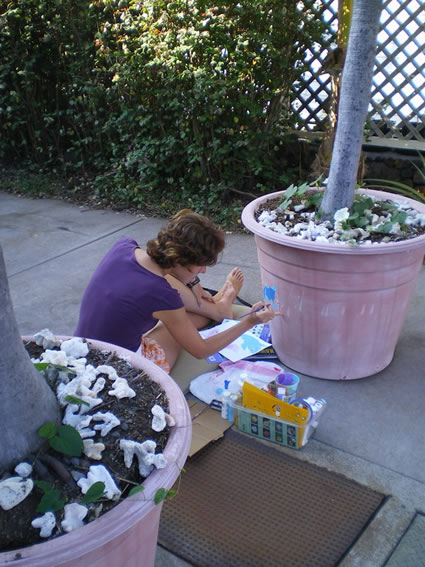
|
|
I even found a caretaking job
that involved painting artwork around the property.
|
Are you looking to travel long-term,
but don’t have the cash to take off for months or
years at a time? Or are you already on the road wanting
to extend your trip, but have no money to back it up? And
are you a hard-working, eager volunteer, ready to get your
hands dirty (sometimes literally)?
If you answered yes to any of the above
questions, then you may be a great candidate for caretaking
your way around the world.
As a Professional Hobo, I am working
(or rather, caretaking) my own way around the world. I travel
full-time and professionally, volunteering in trade for
my accommodation, and earning a few extra bucks with side
jobs and internet work to take care of other expenses. As
such, it is a fully sustainable way of traveling, allowing
me to theoretically do it forever. The opportunities for
this lifestyle are boundless — you just have to know
where to find them and whether or not it is your cup of
tea.
What is Caretaking?
Literally, caretaking is the act of
taking care of a property or building (or sometimes a person
or people). And in some cases, that is exactly what the
job entails. Figuratively speaking though, caretaking is
a way of living which involves trading work for accommodations
in some form. You work part-time on the task at hand, and
in return, you will receive a place to live (either free
or subsidized), and sometimes extra perks like training,
food, or even transportation depending upon the arrangement.
There are caretaking positions available
all over the world, and a number of different resources
(covered later) allow you to find these positions.
What Does it Take to be a Good Caretaker?
There are a number of qualities that
make a good caretaker. You may not immediately and inherently
possess these characteristics, but many of them can be learned
and incorporated into your way of living without too much
grief. In many cases it just depends on how flexible you
are and how badly you want to be able to travel long-term
and be free of the dreaded "rat race."
In my "former life” I was
a high-profile business owner in Canada. Image was paramount,
and I rarely left home without a suit on and an assortment
of business gadgets dangling from every limb. Less than
one year later as a caretaker in Hawaii, and I was milking
goats and recycling my own poop. Juxtaoppose these images
of me and you might have been hard-pressed to see the resemblance.
Neither image was a deviation from who I am as a person;
rather they were just two very different sides of me. I
initially struggled to embrace such a drastically different
lifestyle, but in the end I couldn’t have been happier
with my decisions.
The following are a few characteristics
that lend themselves to a caretaking lifestyle:
-
Ability to adapt to different environments
with ease
-
Desire to work on a craft in your
spare time, such as writing or art
-
Have enough time (i.e.: weeks or
months or even years) to devote to a caretaking position,
without strings tying you back home
-
Eagerness to take on a variety of
tasks, including gardening, animal husbandry, and “grunt” jobs
-
Good references (background checks
are sometimes performed)
-
Flexibility with lifestyle and location
Caretaking also involves what some people
may see as sacrifices or lifestyle changes that should be
noted:
-
You will be living and working in
the same place
-
Your “boss” is also
your “landlord” (so if you and your boss
don’t get along, you’ll be looking for both
a place to stay as well as a job)
-
Situations are often remote
-
Living conditions vary incredibly
from tent sites to 5-star accommodations
-
Working conditions vary as much
as the living conditions
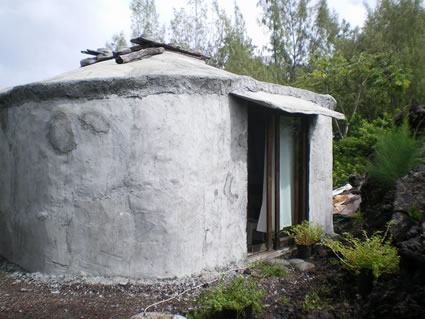
|
|
Accommodations range from tent
sites to 5-star digs — the possibilities are endless.
|
What Does the Job of a Caretaker
Entail?
The specific tasks of a caretaker vary
dramatically from position to position. I have managed youth
hostels, maintained ecologically sustainable permaculture
properties, tended estate gardens, taken care of pets, created
administrative and marketing plans, and cleaned guest houses.
And although what I have done covers a wide range of typical
caretaking responsibilities, there are any number of deviations
from this theme.
However, typical caretaking jobs generally
encompass any of the following:
-
Gardening
-
Ranch hands
-
Agriculture and permaculture
-
Cleaning
-
Campground management or maintenance
-
Taking care of elderly folks or
children
-
House sitting
-
Pet sitting
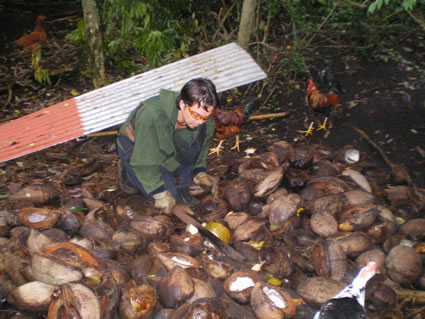
|
|
You could be chopping coconuts
or doing computer work; the jobs vary from place to
place.
|
Who is a Typical Caretaker?
Caretakers vary in nature almost as
much as the range of caretaking jobs do. Younger retirees
form an increasing demographic of caretakers; those who
are finished with the work force and eager to travel and
experience new things, but who many not have the financial
ability or desire to travel long-term as typical tourists.
Artists (writers, visual arts, and
musicians) also gravitate towards caretaking (as I have),
since working part-time in trade for accommodations leaves
lots of time to hone a craft of choice.
And young people looking to escape
the typical life laid out for them (either as a gap year
traveler or lifestyle choice) make for yet another type
of caretaker, as do mechanically minded people who don’t
put much credence in the idea of “home” and
enjoy a nomadic lifestyle.
How do I Find Caretaking Jobs?
There are many resources you can explore
for caretaking positions around the world.
WWOOFing is a common source for agricultural-centered
caretaking positions. Both imply that work on organic
farms is the full scope of available positions; however
I found my hostel management position on Organic Volunteers,
and discovered numerous opportunities through surfing WWOOFing
sites that have very little if anything to do with farming
or agriculture. If you search around enough, you can find
positions at both the above sites for artist retreat internships,
cooking, teaching, caring for children, nursing the elderly,
farm maintenance, and handy work. There is usually something
available for anybody interested in a given lifestyle.
There are also many volunteer organizations
that piggyback on the WWOOFing platform, which you will
find as you poke around the internet. The WWOOF site alone
provides numerous links for volunteering, ecotourism, and
working exchange sites that are worth researching. Work
Away and Help Exchange are two such examples, featuring
opportunities worldwide to trade some elbow grease for a
roof over your head.
If you are interested in house and pet
sitting, House Carers is a great site for you. Opportunities
range from a few days to a few months, with a large contingent
of the listings located in Australia and New Zealand.
And one of the best resources I have
found to date is the Caretaker’s Gazette, which connects
caretakers with rent-free living positions. Membership will
entitle you to the quarterly newsletter chock full of global
listings (available online or by mail), as well as regular
updates with new listings that come through at least once
a week. Again the variety of positions available is staggering,
as are the locations in which you can enjoy them. Some of
the jobs listed in Caretaker’s Gazette are full-time
paying jobs, while others are simply part-time volunteer
work exchanged for free room and board.
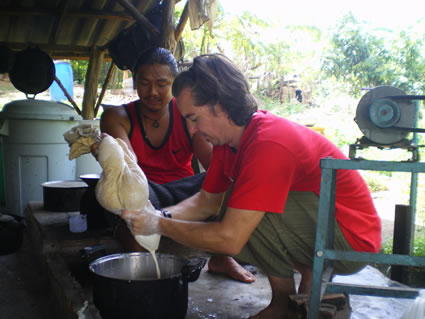
|
|
From cooking to gardening to
odd jobs, you can find a caretaking job just for
you.
|
The Advantages of Caretaking
Aside from the obvious ability to extend
your travels or take off for an inexpensive long-term trip,
caretaking has its own set of advantages. If travel to you
means really getting to know a place, culture, language,
and people, you can’t really do anything more than
skim the surface if you are passing through as a backpacker.
By caretaking and staying for a few weeks to months (to
even years) in one place, living and working with locals,
and integrating into the local community, you will see the
underbelly and inner workings of your destination; you may
even learn to call it home for a time. Sometimes you will
be delighted by what you find, and other times you may feel
disillusioned. Either way, you can say that you truly saw
that place for what it was, and you will likely walk away
with a whole new set of skills under your belt and a wide
variety of friends in far away places.
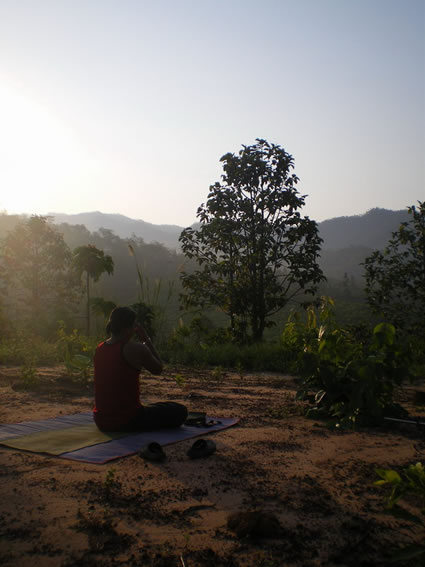
|
|
Try teaching yoga with a backdrop
to die for.
|
A Word to the Wise about Caretaking
Positions
The interview process for many caretaking
positions is accomplished online through email and occasional
phone conversations. Since many caretakers will be traveling
to the destination specifically for the caretaking job (I
traveled to Hawaii for my first position, across Australia
for another, and was on my way to Ecuador for a third before
it fell through), face-to-face interviews aren’t always
possible. This is a giant leap of faith not only for the
host but also for the caretaker.
As such, be sure to develop an exit
strategy that works for both parties. Many jobs will require
a minimum commitment period, but if it isn’t working
for either party, fulfilling a 6-month commitment could
feel like a prison sentence. By stating clearly that either
party can give notice of a few weeks or a month, both the
host and caretaker will be protected from suddenly being
homeless or conversely without a needed employee, and can
make necessary arrangements in advance of the relationship
ending.
Also, don’t be afraid to go with
your gut instincts. A host with whom I was once interviewing
set off some red flags. But because the position description
seemed idyllic, I ignored the warning signs and accepted
the job. Sadly, the very things that mildly concerned me
about the position turned out to be huge problems (not only
for me, but for a series of previous and future caretakers
too). The days felt like years, and nobody was happy or
productive as a result. The wrong caretaking position can
be terribly difficult to get through, so do yourself a favor
and listen to your instincts if you feel something is amiss.
Since learning about exit strategies
and trusting my gut, I have enjoyed caretaking positions
around the world that are immensely satisfying and incredibly
varied. Having good references and experience in the industry
now paves the way for me to continue to caretake my way
around the world — getting to know the locals and planting
roots (literally and figuratively) everywhere I go.
|
Are There Costs While
Caretaking?
As with so many things in life,
nothing is free, though sometimes a little investment
can bring a big return. With marginal membership
rates, these resources can get you started on your
next caretaking position (or at least daydreaming
about it) very quickly:
The
Caretaker Gazette contains property caretaking / house-sitting
openings in the U.S. and in countries worldwide.
Published since 1983, subscribers receive 1,000+
property caretaking opportunities each year.
Some caretaking and house-sitting jobs offer
compensation in addition to the free housing
provided. Short, medium, and long-term property
caretaking assignments are in every issue. $30 a year starting at a 1-year online access and available in print as well (see website).
WWOOFing:
Each country has its own membership process, and
upon joining you will receive a booklet (only some
countries are fully online) with WWOOFing members
and opportunities for the area joined. Costs vary
by region, and you would be best to join well in
advance of your travels to get the most use out
of your membership booklet.
Help
Exchange: There is a free membership option
so you can acquaint yourself with the website
and various listings. However if you really
want to make use of the site, the €20
Premier membership (lasts two years) allows
you to contact hosts directly through the site
and read reviews — a helpful service.
Workaway:
The $49 yearly membership will get you started
on a platform similar to the above sites.
Workaway hosts offer various jobs and activities, including house sitting, individual exchanges, teaching projects including English, farm stays, community projects, NGOs & charities, environmental projects, animal welfare, hostels, families & homestays, boating & sailing, and much more across Oceania.
Many of the opportunities offer free room and board with various options depending on the host. Workaway provides resources to help you get the most out of your experience and emphasizes safety.
Sabbatical Homes: Offers caretaking opportunities abroad.
Note: See Nora Dunn's piece on House-Sitting
Jobs Abroad for more related ideas on free
or low-cost accommodations abroad and read her
eBook How
to Get Free Accommodation Around the World.
|
Nora
Dunn is a Professional Hobo and freelance writer, traveling
the world one caretaking position at a time. She has lived
in ocean-side yurts, camper vans, hostel rooms, and even
5-star accommodations, all in exchange for part-time work.
You can learn more about her caretaking adventures at www.theprofessionalhobo.com.
|
